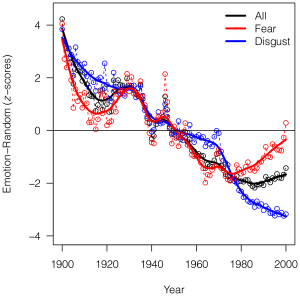 I heard this on NPR last night and found it to be an interesting intersection between digitizing books and big data.
I heard this on NPR last night and found it to be an interesting intersection between digitizing books and big data.
Were people happier in the 1950s than they are today? Or were they more frustrated, repressed and sad?
To find out, you’d have to compare the emotions of one generation to another. British anthropologists think they may have found the answer — embedded in literature.
Several years ago, more or less on a lark, a group of researchers from England used a computer program to analyze the emotional content of books from every year of the 20th century — close to a billion words in millions of books.
This effort began simply with lists of “emotion” words: 146 different words that connote anger; 92 words for fear; 224 for joy; 115 for sadness; 30 for disgust; and 41 words for surprise. All were from standardized word lists used in linguistic research.
The original idea was to have the computer program track the use of these words over time. The researchers wanted to see if certain words, at certain moments, became more popular.
Read and listed to the full story @ NPR.org. The full journal article is available on PLOS ONE.